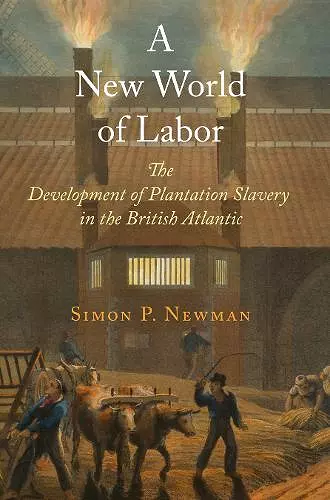A New World of Labor
The Development of Plantation Slavery in the British Atlantic
Format:Paperback
Publisher:University of Pennsylvania Press
Published:18th Apr '16
Currently unavailable, and unfortunately no date known when it will be back
This paperback is available in another edition too:
- Hardback£81.00(9780812245196)

A New World of Labor connects developments in seventeenth-century Britain with the British experience of slavery on the West African coast and with the initial development of African chattel slavery in Barbados, whose labor system played a foundational role in defining how plantation slavery developed throughout British America.
The small and remote island of Barbados seems an unlikely location for the epochal change in labor that overwhelmed it and much of British America in the seventeenth and eighteenth centuries. However, by 1650 it had become the greatest wealth-producing area in the English-speaking world, the center of an exchange of people and goods between the British Isles, the Gold Coast of West Africa, and the New World. By the early seventeenth century, more than half a million enslaved men, women, and children had been transported to the island. In A New World of Labor, Simon P. Newman argues that this exchange stimulated an entirely new system of bound labor.
Free and bound labor were defined and experienced by Britons and Africans across the British Atlantic world in quite different ways. Connecting social developments in seventeenth-century Britain with the British experience of slavery on the West African coast, Newman demonstrates that the brutal white servant regime, rather than the West African institution of slavery, provided the most significant foundation for the violent system of racialized black slavery that developed in Barbados. Class as much as race informed the creation of plantation slavery in Barbados and throughout British America. Enslaved Africans in Barbados were deployed in radically new ways in order to cultivate, process, and manufacture sugar on single, integrated plantations. This Barbadian system informed the development of racial slavery on Jamaica and other Caribbean islands, as well as in South Carolina and then the Deep South of mainland British North America. Drawing on British and West African precedents, and then radically reshaping them, Barbados planters invented a new world of labor.
"Newman's terrific book is among the very best studies we now have of labor systems and of ordinary people in the British Atlantic World. It focuses on workers-Europeans, Africans, and people of mixed races-who, of course, accounted for the majority of the inhabitants of that world. It also explores the range of labor systems developed by British, Africans, and Barbadians that formed the economic engine shaping many of the societies bordered on or surrounded by the Atlantic Ocean. A New World of Labor both represents the maturing of Atlantic World history and charts new directions for scholars studying that area." * Reviews in American History *
"Newman's contributions are many: to reemphasize class as a determinant for the dehumanizing features of slavery; to place chattel slavery onto a spectrum of labor exploitation to further complicate and diffuse the relationship between race and slavery; to pinpoint Barbados as the birthplace of this class-based exploitation, but also to place Barbados into an integrated circum-Atlantic perspective that includes thorough analyses of the labor regimes of seventeenth-century England and eighteenth-century West Africa; and to decenter narratives of slavery's genesis that focus on the American mainland and on race. The overall effect of A New World of Labor is a biographically textured and geographically expansive labor history that will act as a provocative foreground for established narratives about the development of racial slavery." * American Historical Review *
"A New World of Labor is a landmark event in British Atlantic history. It is a major book by a major historian and will have an enormous impact on the way we conceptualize any number of topics, from the importance of integrating once again seventeenth-century British developments with developments in Africa and the Americas; to the necessity of seeing the Atlantic slave trade as considerably different in Africa and America; to reassertions of the centrality of labor in understanding New World social and cultural development." * Trevor Burnard, author of Mastery, Tyranny, and Desire: Thomas Thistlewood and His Slaves in the Anglo-Jamaican World *
"This wide-ranging study persuasively argues that flexible and adaptable forced labor systems existed in the British Atlantic, and that Barbados was a major cultural hearth, where planters invented a new and exportable form of bound labor. A New World of Labor is a powerful and impressive work." * Philip D. Morgan, Johns Hopkins University *
"A New World of Labor possesses a number of strengths to recommend it. Importantly, Newman contrasts the conditions for workers with indentures in England versus those in the Caribbean, pointing out how much more in keeping with slave labor the indentured worker was in Barbados. Also significant is the equal attention he gives to European and African workers in the Royal African Company. Indeed, in Newman's hands, the English are finally given the same sort of comprehensive treatment that other scholars have devoted to the Dutch and Danish employees on the gold coast." * John Thornton, author of Africa and Africans in the Formation of the Atlantic World, 1400-1680 *
- Winner of Awarded the 2013 Book Prize by the British Association for American Studies 2021
ISBN: 9780812223620
Dimensions: unknown
Weight: unknown
336 pages